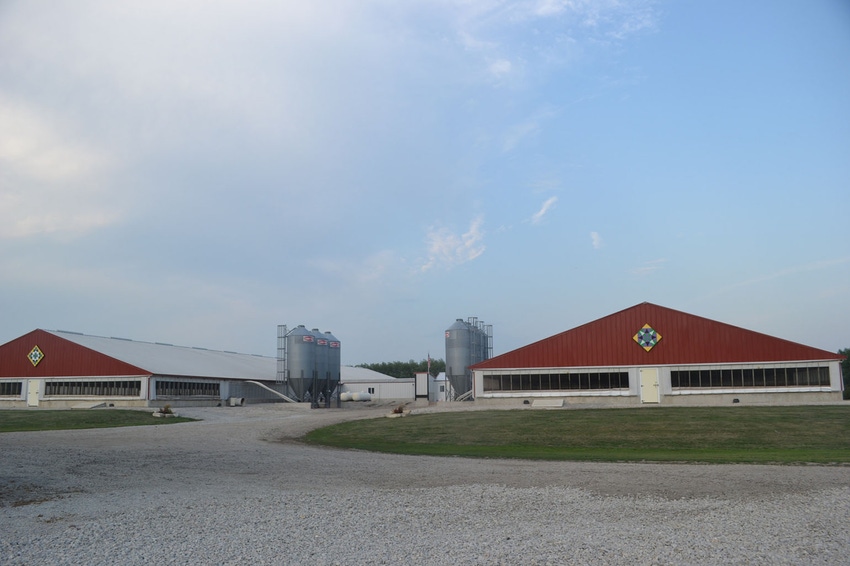Through the premises registration database, the DATCP’s Division of Animal Health has a vital tool to help prevent and control the spread of disease.
March 4, 2019

The Wisconsin Department of Agriculture, Trade and Consumer Protection in partnership with the Wisconsin Livestock Identification Consortium reminds anyone who owns livestock* to register the location where animals are kept. This is referred to as premises registration.
Whether you have one animal or thousands, and regardless if your facility is required to be licensed, state law requires any location that keeps livestock to be registered with the DATCP. There is no cost to register and the information you provide is confidential. The DATCP uses the information to rapidly respond to animal disease outbreaks in order to protect animal health, the food supply, public safety and Wisconsin’s agriculture economy.
Examples of locations with livestock that need to register include the following.
Farms and hobby farms
Backyard poultry flocks
Veterinary clinics with large animal hospital facilities
Stables
Livestock exhibitions, markets and feedlots
Dealers and haulers that keep livestock on their property
Slaughter, rendering and dead animal facilities
Any other location where livestock is kept or congregated
Between March and July, the DATCP will mail over 60,000 renewals to current livestock premises registrants. Current registrants must renew their livestock premises by July 31. If you no longer have livestock, you must report this to update your location. The DATCP conducts renewals every three years.
If you need to register a new location, more information is available below and on the DATCP’s website. Those who have livestock and do not register their location are subject to fines and are not eligible for a state indemnity payment for animals condemned due to disease exposure.
How to register your premises
New registrants can get a paper application from the WLIC through the following methods.
Visit WIID.org and clicking on “Premises Registration”
Calling 888-808-1910
Emailing [email protected]
If your premises are currently registered, you will receive a prefilled renewal notice sometime between March and July this year. Review your information and return it in the mail. Due to a high volume of locations that need to be registered, registrations will be processed in the order they are received.
Once the WLIC processes your registration or renewal, a confirmation letter with a premises ID will be emailed to you. If you indicate that you would rather receive your confirmation by mail, then you will receive a card with this information. You will need to keep your ID number for future reference as some municipalities, organizations or events such as fairs may ask for this in order to participate in activities.
Protecting Wisconsin and beyond
Certain animal diseases threaten not only Wisconsin, but the nation. Through the premises registration database, the DATCP’s Division of Animal Health has a vital tool to help prevent and control the spread of disease. What used to take weeks of going through paper documentation and driving door-to-door to identify locations and notify owners can now be done in minutes. Registering your livestock premises supports disease management by protecting the health of all livestock, many of which are used in food production.
Some diseases also pose a threat to human health making rapid response essential to public safety. Having a system with proper trace back and trace forward capabilities also provides for a timely response to minimize the economic impact in the event of an outbreak. According to the USDA’s National Agricultural Statistics Service, Wisconsin’s agriculture contributes $88.3 billion annually to the state’s economy with the dairy industry contributing almost half of that at $43.4 billion.
Premises registration basics
Premises registration provides the DATCP with information about what kind of livestock you have, where they are located and how to contact you in case of an animal disease outbreak. The system assigns each location a unique ID number that stays with the location — meaning a change in property ownership will not change the premises ID. Individuals with religious beliefs opposing registration of a livestock premises can submit a request for an exemption. Premises registration is not individual animal identification, though an individual animal’s ID is connected to a premises ID for tracing where animals have traveled.
In 2004, the Wisconsin Legislature passed the law for premises registration and it became mandatory in 2006, making it the nation’s first mandatory premises registration law and has since become a national model. The DATCP continues to implement the legal requirement for registering locations and the WLIC provides the registration service.
More information
More information about premises registration is available here.
*Livestock includes any of the following: Cattle and other bovine animals; swine; poultry; sheep; goats; horses and other equine animals; farm-raised deer and other cervids; gamebirds including pheasants, quail, wild turkeys, migrating waterfowl, pigeons, and exotic birds raised in captivity; bison; llamas and other camelids; ratites such as emus and ostriches; and farm-raised fish.
Source: Wisconsin Department of Agriculture, Trade and Consumer Protection, which is solely responsible for the information provided, and wholly owns the information. Informa Business Media and all its subsidiaries are not responsible for any of the content contained in this information asset.
You May Also Like



